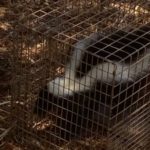Department of Land and Natural Resources (DLNR) found a skunk in a trap, that was set with the intention to catch feral cats and mongoose, in the Kanahā Pond State Wildlife Sanctuary on Maui Tuesday morning. The skunk has been euthanized and turned over to the Hawai`i Department of Agriculture (HDOA).
Although the origin of the skunk is unknown, in January 2021, a skunk was reportedly spotted near the Maui Costco gas station which is near the Kanahā Pond sanctuary. At the time, a rapid response team set out nine traps for about three weeks, but no skunks were captured. Since the origin is unknown, the skunk is being tested for rabies.
Skunks are prohibited in Hawai`i and are only allowed by permit for research and exhibition in a municipal zoo. Skunks inhabit the U.S., Canada, South America, Mexico and other parts of the world. In the U.S., they are recognized as one of the four primary wild carriers of rabies, a fatal viral disease of mammals that is often transmitted through the bite of an infected animal. Hawai`i is the only state in the U.S. and one of the few places in the world that is free of rabies.
Skunks are avid egg-eaters, preying on any birds that nest on the ground. According to DLNR, the Kanahā Pond Wildlife Sanctuary is the first wetland set aside for protection in Hawai‘i. It is a critical nesting habitat for four species of waterbirds unique to the Hawaiian Islands: ae‘o, (Hawaiian stilt), ‘alae ke‘oke‘o (Hawaiian coot), koloa (Hawaiian duck) and the nēnē.
Live skunks have been spotted by stevedores and captured at Honolulu Harbor in June 2022, July 2021, January 2021 and February 2018. On Maui, a live skunk was captured at Kahului Harbor in December 2020 and one was captured at a trucking company in August 2018. All previously captured skunks have tested negative for rabies.
Sightings or captures of illegal and invasive species should be reported to the state’s toll-free Pest Hotline at 643-PEST (7378).
(Photo credit: DLNR)
